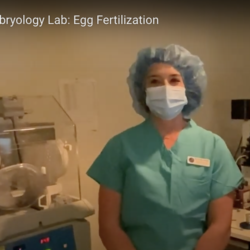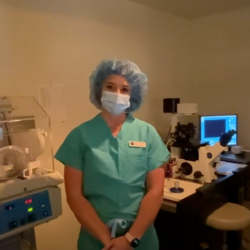
In vitro fertilization (or IVF) is one of the most effective treatments to improve your chances of pregnancy. However, it is a complex process that requires a number of steps. The first step you’ll undergo is the pre-IVF process, or preparation phase. This step is geared to maximizing your chances of conceiving. This is what you can expect at this step of your IVF journey.
What is the pre-IVF process?
During the preparation phase, you’ll undergo a variety of pre-IVF tests and screening. Based on the results of these tests, your fertility specialist can pinpoint issues that are preventing you from becoming pregnant. These tests will help your team customize their IVF approaches to improve your chances of pregnancy.
For example, test results can guide your doctor in selecting the proper types of medications and doses for your treatment. They may highlight a structural issue that could be treated with surgery, or an infection that could be treated with antibiotics. Or, these tests could point to any underlying hormonal issue or condition.
Further, this stage sets the groundwork for building a trusting relationship with your fertility team. After trying and failing to conceive naturally, you and your partner are likely stressed and maybe even anxious about trying IVF. Your team will be there every step of the way to discuss what you can expect, how to manage stress, and how to increase your chances of a successful pregnancy.
We cover some of the ways to prepare for IVF, both mentally and physically, in an earlier post. We encourage you to read this one as well as our top advice from others who have already gone through IVF. Together, these posts can give you a better idea of what to expect and how to ready yourself.
What tests need to be done before IVF?
Pre-IVF tests give your fertility team a true picture of your unique fertility challenges. This starts with a full medical history. During your initial consultation, your doctor will ask about you and your partner’s medical and family history.
They’ll also ask about any lifestyle factors that could affect fertility. For example, tobacco, alcohol, and excessive caffeine usage can all affect fertility. When appropriate, your doctor will give instructions about nutritional supplements, exercise, weight loss, and sexual behavior as you get started with IVF.
From there, your pre-IVF tests will usually include:
- Ovarian reserve testing: This is done to determine the quantity and quality of your eggs by taking a blood sample early in the menstrual cycle. It can determine your fertility potential and identify any age-related declines. When combined with an ultrasound of the ovaries, this can help predict how your ovaries will respond to fertility treatments.
- Uterine cavity exam: This exam can be done via ultrasound or by using a hysteroscope, which is a thin flexible tube with a small camera on the end. The hysteroscope is inserted through the vagina and cervix and into the uterus, allowing your doctor to evaluate the health and structure of your uterus.
- Infectious disease screening: You and your partner will be screened for any infections that may be leading to fertility challenges. If present, they’ll prescribe antibiotics or other appropriate treatments.
- Semen analysis: This step may occur before you ever consider IVF, or you may do as part of the pre-IVF process. A semen analysis helps determine the quality and number of sperm produced. You can learn more about what’s tested in a semen analysis, and how to prepare, in our earlier post.
- Hormonal evaluation: Conditions like thyroid issues or polycystic ovary syndrome (PCOS) can affect your hormone levels and create problems with conception or pregnancy. A hormone evaluation can help your doctor avoid complications.
Other steps in the pre-IVF process
Depending on your fertility challenges and risk factors, your doctors may perform other tests or screenings. They’ll resolve any underlying conditions with hormonal therapy, medications, surgery, or other treatments.
In certain cases, they may also perform a practice embryo transfer to determine if there will be any complications during an actual transfer. It helps your fertility team determine what technique will have the greatest success in placing embryos in your uterus.
Finally, later in the IVF process, you or your partner will need to administer some medications by injection. To alleviate anxiety, your fertility team should offer hands-on instructions for administering the injections. If you have any questions, don’t hesitate to ask. They’re there to make you feel comfortable throughout the process.
Learn more about IVF treatment steps
After you complete the pre-IVF process, you’ll review testing results with your doctor. They’ll create an IVF treatment plan based on the information they gathered during this phase that outlines every step of your IVF journey.
In general, the IVF process is broken into four steps:
- Preparation
- Retrieval
- Insemination
- Embryo transfer
Each link above goes to an in-depth discussion of that stage of the IVF process. The following video also gives a quick summary. We invite you to review both fully.
[siteorigin_widget class=”WP_Widget_Media_Video”][/siteorigin_widget]Learn more about the pre-IVF process
The Fertility Institute has been on the leading edge of IVF and other fertility treatments for more than 30 years. Our own Dr. Richard Dickey performed the first in vitro fertilization procedure in the Gulf South in the 1980s.
Put simply, we’re here to help. With decades of experience in IVF, we can develop a treatment plan that gives you the very best chances of conceiving. If you’re in Louisiana or our neighboring states, we encourage you to reach out to our team with any questions.
Call or message us online to book your appointment.



